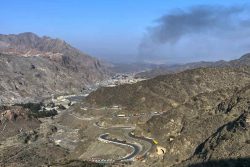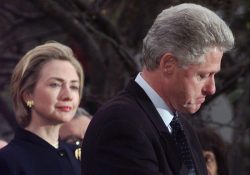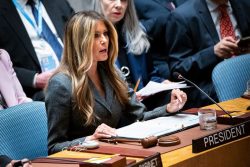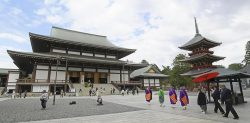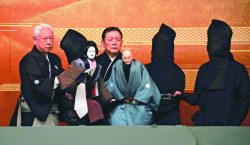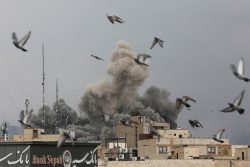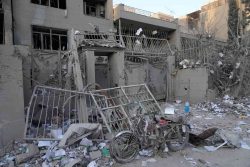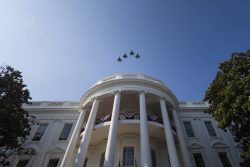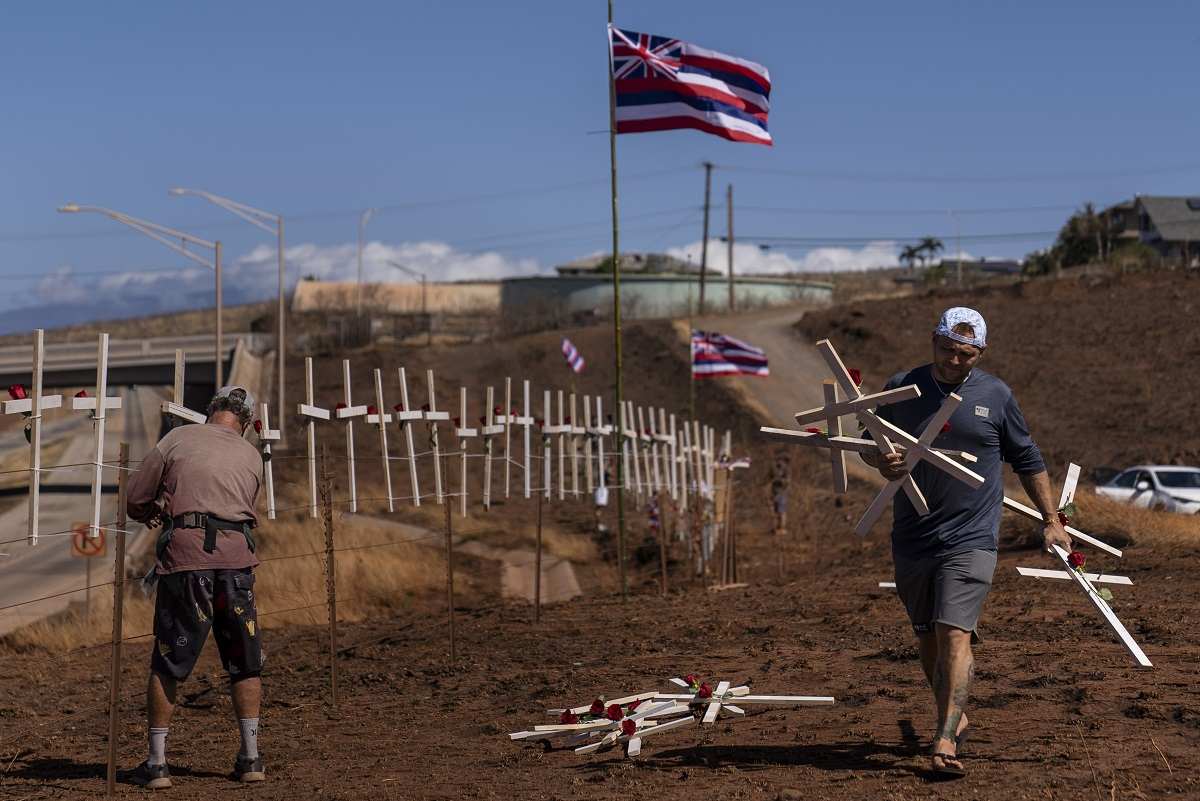
Ethan Meyers, right, carries crosses to put up to honor the victims killed in a recent wildfire in Lahaina, Hawaii, Tuesday, Aug. 22, 2023.
16:13 JST, August 27, 2023
LAHAINA, Hawaii (AP) — Families were torn asunder. A community is reeling with grief. More than 100 people have perished and dozens more remain missing after flames and smoke barreled from the hills and annihilated the historic town of Lahaina.
But even in places overwhelmed by despair and devastation, the Hawaiian spirit known as ohana endures.
In the Hawaiian lexicon, ohana is a sensibility, a way of thinking that means family, belonging, community and so much more — solace in a time of calamity. It is a unifying principle in an increasingly fragmented world. And in recent weeks, amid misfortune, the word has taken on profound importance in a place appealing for help.
“In times like this, ohana gets stronger,” says Dustin Kaleiopu, whose Maui roots date back to when monarchs ruled the islands.
The kanaka of Hawaii, the Native Hawaiians who inhabit the islands, value ohana, which extends beyond the familial ties of blood. It is a life nourished by kinship.
“In a small town like Lahaina, we all know each other. We’ve all grown up together,” says Kaleiopu, whose ohana came to his aid after he and his grandfather escaped the flames that turned their home into a mound of ash and charred debris. “It’s such a tight-knit community.”
TESTING THE BONDS OF OHANA
Finding grace and solace can be almost unimaginable when the very world around you is burning. This is what Lahaina faces today as the smoke begins to clear.
Thousands of other homes are gone. At least 115 people are confirmed dead. And by some counts, more than 100 of Lahaina’s residents remain unaccounted for: fathers and mothers, husbands and wives, brothers and sisters, young and old, friends and neighbors — all part of someone’s ohana.
“There’s plenty of families who’ve been displaced by the fire. So we’re going to take care of our community as much as possible. So in this sense, our community is the ohana,” says Kapali Keahi, whose family has lived on Maui for generations.
In the days, and now weeks, after the deadliest wildfire in the United States in more than a century, families who lost homes and possessions continue to depend on the generosity of relatives, friends and even strangers. Shipments of food, clothes and everyday necessities keep arriving from the state’s other islands, including Oahu, home to Honolulu.
Online fundraisers, many set up by displaced families, have raised hundreds of thousands of dollars, much of it from distant places. One relief fund has well surpassed $1.2 million, its 6,400 donors hailing from every part of the globe.
So much of Lahaina has been lost. Left behind are people in deep despair, said Kekai Keahi, another Lahaina resident. One thing, though, remained strong: a connecting strand.
“Ohana was never lost. It never left,” he said. “We will always come to each other’s aid.”
Keahi spoke as Hawaiian flags fluttered near the ocean and a Native Hawaiian group calling itself Na ‘Ohana o Lele — the ohana of Lahaina — gathered at a beachside park to speak on behalf of their community.
The message from the group was clear: There will be talk of rebuilding, yes, but families need time to grieve and begin healing before any of that begins.
Archie Kalepa, a surfing legend and revered member of Maui’s Native Hawaiian community, urged his ohana to honor core values. “Love your family, take care of the land,” he said, “and you’ll rebuild your community.”
MANY PEOPLE FROM MANY PLACES, UNITED
The community of 13,000 people included immigrants from many parts of the world. Here, they find common ground.
No matter where they came from, no matter when they arrived, transplants are soon charmed by Hawaii’s culture, a melange of imported customs and traditions melded together by ways in existence long before the British imperialist and explorer Capt. James Cook came across the Hawaiian archipelago nearly 250 years ago while crossing the Pacific.
As they assimilate, newcomers pick up the oft-spoken vocabulary intrinsic to island life. “Mahalo” conveys gratitude, admiration and respect. “Aloha” is for hello and goodbye, or for love and affection — a word with the warmth of a hug and the beauty of a lei.
Then there is ohana. As the movie “Lilo & Stitch” defined it, “ohana means family, and family means nobody is left behind or forgotten.”
With so many dead or missing, a sentiment like that is ripe to resonate across a community coping with loss.
“It’s all about family out here,” says Mike Tomas, whose immediate family lost their home in the fire and are sheltering in the homes of friends and relatives. He had planned to move with his girlfriend to Texas sometime in the fall, but they will now depart much sooner.
“Nothing’s left here,” he says. Not even the clothes and belongings they had begun packing. But he knows he’ll be back.
“This has always been home,” he says. “This is where family is.”
Amber Bobin moved from Chicago to Maui nearly four years ago. She says she was drawn, in part, by the culture and strong bonds of community.
Earlier this week, she joined a small group to hang 115 crosses on fences erected along the road that cuts through Lahaina. That’s a single cross for each of the souls whose remains have been found. Bobin expected to hang more crosses in the coming days. The fence also was festooned with a collection of ribbons, one for every person still missing.
And if ohana is a way of life in good times, those crosses and ribbons help reveal what it is in tough ones: a mindset that ensures those who have been part of you remain so, even after they were torn away by forces no one imagined would be visited upon home.
“To be able to experience what ohana means, especially in tragedy,” she says, “has been significantly impactful.”
Top Articles in News Services
-

Survey Shows False Election Info Perceived as True
-

Hong Kong Ex-Publisher Jimmy Lai’s Sentence Raises International Outcry as China Defends It
-

Japan’s Nikkei Stock Average Falls as US-Iran Tensions Unsettle Investors (UPDATE 1)
-

Japan’s Nikkei Stock Average Touches 58,000 as Yen, Jgbs Rally on Election Fallout (UPDATE 1)
-

Japan’s Nikkei Stock Average Rises on Tech Rally and Takaichi’s Spending Hopes (UPDATE 1)
JN ACCESS RANKING
-

Producer Behind Pop Group XG Arrested for Cocaine Possession
-

Japan PM Takaichi’s Cabinet Resigns en Masse
-

Man Infected with Measles Reportedly Dined at Restaurant in Tokyo Station
-

Israeli Ambassador to Japan Speaks about Japan’s Role in the Reconstruction of Gaza
-

Videos Plagiarized, Reposted with False Subtitles Claiming ‘Ryukyu Belongs to China’; Anti-China False Information Also Posted in Japan



